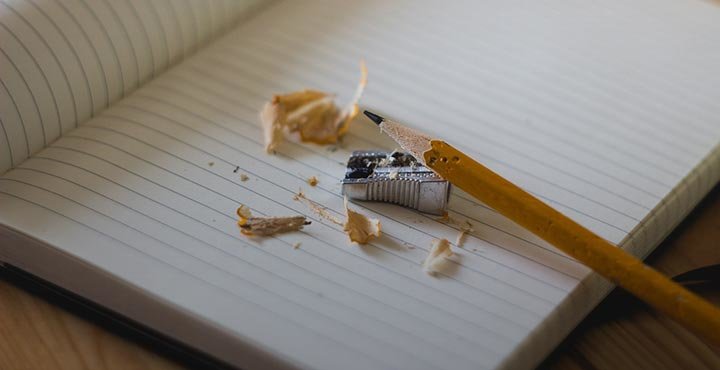Written by Scribendi
You're a creative writer, which means you have that itch to write, whether it is poetry or fiction, essays or scripts.
But getting started can be hard, and searching for help online can be overwhelming. There are so many creative writing tips out there that you would never actually write if you tried to read them all.
That's why we decided to compile some of our most helpful writing tips in a single place, which will allow you to start writing sooner. These articles cover five main topics: reading, seeking inspiration, writing tips, workspace optimization, and editing.
Read them all or just those that are most helpful to you. By the time you're done, you'll feel motivated to put your new creative writing knowledge to use.
Reading to Fuel Creative Writing
Most articles about how to become a writer (including our article How to Become a Writer: 12 Baby Steps to Help You Reach Your Goal) list the same piece of advice first: read.
If you want to be a writer, you probably already read insatiably, but it's still good advice. Reading outside your usual genres and styles—reading anything you can get your hands on, really—will help you learn how language works. You will learn firsthand the various ways to tell a story, learning what grabs a reader's attention and what does not.
Reading the work of other writers is sometimes daunting. You might feel as if everything has already been written—but that's not true. The more you read, the more you will be inspired, and the less likely you are to unknowingly reproduce something that has already been done.
Check out these articles to start feeding your imagination:
- Are You a Writer?
- 34 Compelling First Lines of Famous Books
- 20 Awesome Movies Available on Netflix That Are Based on Books (+11 Bonus Suggestions!)
Inspiration to Jumpstart Creative Writing
Now that you're busily reading five books at any given time (just me?), it's time to start writing. Beware of feeling that you have to finish reading anything before you start writing. That's a recipe for writer's block.
Instead, make both reading and writing part of your daily routine. Even if you aren't working on a specific project, you can set aside time every day to write in a journal or respond to a writing prompt. Follow the links below for some ideas to get your creative writing started:
- Why Every Author Should Start Writing a Journal
- 8 Visual Writing Prompts Worth a Thousand Words
- The 30-Day Writing Challenge: An Alternative to NaNoWriMo for Writers Who Fear Commitment
- Practice Makes Perfect: How Writing Every Day Can Make You a Better Writer
Tips to Help Improve Creative Writing
After your daily writing practice has produced some rough material, you may notice some themes or images coalescing, and these may give you an idea for a project. Whether you want to write a short story, a novel, or a screenplay, it can be helpful to seek out advice from expert writers.
Take a look at the articles below to benefit from writing tips that others have come up with from their experiences:
- How to Write a Believable Protagonist and Antagonist
- Short Stories: Wondering How to Fit Your Big Ideas into a Small Space?
- Writing Tips from the Screenwriters Who Wrote Your Favorite Shows
Workspace Optimization to Support Creative Writing
Once you establish a regular writing practice and start working on a project, you might notice that your desk setup is not as conducive to writing as it could be. Maybe your uncomfortable desk chair has you squirming, or maybe your bright desk lamp is giving you a headache. Maybe you need a plant on your desk, or maybe improving your workflow will be as simple as downloading a new piece of software or hiding your desk's clutter away in a drawer.
Read our article below to streamline your workspace:
Editing to Perfect Creative Writing
It's time to get down to one of the more intimidating tasks of a writer: editing your work. Don't be afraid, though. The more you write and read your own work, the more familiar you will become with your bad habits and the easier it will be to fix them. If you find it hard to identify your weak points, try putting your work aside for a few days. When you read it again, it will be with fresh eyes.
It can also be helpful to make a list of some common writing pitfalls to check your work against as you edit. These blog posts will help you identify flaws to look for and help you fix them:
- The Life-Changing Magic of Tidying Up Your Writing with Marie Kondo
- Five Habits to Avoid in Fiction Writing
No matter how good you become at self-editing, it's always a good idea to get another pair of eyes on your work. Ask another writer or check out Scribendi's Book Editing service. Scribendi's editors can help you improve your writing and ensure that your readers will love your next work.
Conclusion
If you've read all the articles linked above, or even a few, you'll know that writing can be hard work. It takes long hours of solitude, focus, deep thought, and conversations with yourself. But that effort pays off, and not just in your writing. Writing can also teach you lessons that are beneficial in everyday life. Now use that emotional honesty to get writing!
Image source: dinabelenko/elements.envato.com
Craft Creative Writing You Are Proud Of
Hire a Professional Editor, or Get a Free Sample
About the Author
Scribendi's in-house editors work with writers from all over the globe to perfect their writing. They know that no piece of writing is complete without a professional edit, and they love to see a good piece of writing turn into a great one after the editing process. Scribendi's in-house editors are unrivaled in both experience and education, having collectively edited millions of words and obtained nearly 20 degrees collectively. They love consuming caffeinated beverages, reading books of various genres, and relaxing in quiet, dimly lit spaces.










